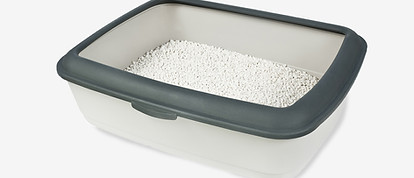
FOSTER 101:
Cat litter box info
We've all been there - for as good as your cat usually is, sometimes you'll come home to a litterbox accident, which is understandably both gross and frustrating! Don't just assume that your cat is deliberately trying to tick you off - he / she is likely trying to communicate with you, and it's key for all involved that you try to understand what they are saying. This page is a guide you should look through to help explore what could be going on with your cat / litter box issues, and things to try to help resolve the unpleasant situation!
Is it health related?
If your kitty randomly starts going to the potty outside of their litterbox, it might be health-related. Some medical conditions, like UTIs (urinary tract infections), can cause urgent or painful urination, which can lead to inappropriate litter box behavior. Make sure you check in with the vet to rule out any other underlying medical issues. It's better safe than sorry, for sure!



CLEAN BOX = HAPPY KITTY
Make sure that you are regularly staying on top of your cat's litter box cleanliness. Cats are naturally clean creatures (ever notice how often they groom?), so ideally, their potty should be a clean and low-stress environment. (think how you feel when you have to use a less-than-pristine gas station or rest area bathroom while on a road trip - ick!) If your cat starts having accidents, try upping the number of daily scooping sessions, as well as upping the frequency of deep cleans. If the accident issue resolves, it's most likely that your cat was telling you that he/she wanted a cleaner litter box environment. You heard him/her: get to it! ;)
Is your kitty new
to your crib?
Sometimes a change of scenery, environment, moving into a new home, etc., can result in litter box mishaps. You know how you can get stressed in similar situations? While you (likely) don't have these types of accidents, you do know your physical and mental cues that indicate you're stressed. To start, it might be a good idea to confine the kitty to a small room, like a bathroom, until they are able to get their bearings and understand their new environment and location of their litter box. Be patient, and give them a little bit of time to adjust - they'll develop appropriate litter box habits as they acclimate and de-stress!


understand your cat's ideal litter box setup / location
We all have a preferred brand of toilet paper, right? Why wouldn't your cat have similar preferences in regard to their litter box?! There are plenty of different types of litter and box types to experiment with (think scented / unscented, clumping / non=clumping, clay, crystals, corn, paper, pine, wheat), in addition to uncovered, covered (front-entry), covered (top-entry) and self cleaning boxes.
If accidents are occurring, try different box styles. For example, some cats might feel uncomfortable in a covered box, so you might remove the lid, or trying an entirely different style. Self-cleaning boxes may startle a skittish kitty, so a more traditional box would be a better bet for them. It will be trial / error, for sure!
Has your kitty been declawed?
While we never recommend de-clawing your cats (ESPECIALLY those who go outdoors), we understand that there are plenty of situations where you might have a declawed cat. Studies have shown that declawed kitties are more likely to have inappropriate litter box accidents. Declawing is extremely painful, and they might associate scratching in the litter box with that pain while they are in recovery.
We suggest trying small animal bedding - it's usually soft and fluffy paper-type material that is softer on the paws. While it isn't actually a litter, it sure can be used as such - whatever makes life better for your cat!


Changes in routine?
Like many humans, cats are a creature of habit, and like a sense of routine and stability. They can struggle with adapting to changes in their environment, which can result in litter box accidents. Things such as family dynamics, guests, daily routines, living in a different space of the house, etc., are all things that can cause stress and potentially lead to accidents. Be sure you are giving them extra love and attention during periods of transition. Kitties will need time to re-establish routines that they are happy with, and it's important to incorporate as much familiarity during the process as possible!





